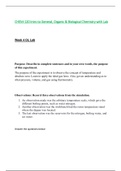Chem 120 week 4 lab - Study guides, Class notes & Summaries
Looking for the best study guides, study notes and summaries about Chem 120 week 4 lab? On this page you'll find 41 study documents about Chem 120 week 4 lab.
Page 3 out of 41 results
Sort by
CHEM-120 Week 4 Lab Questions & Answers
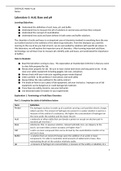
-
CHEM 120: Week 4 Lab Laboratory 5: Acid, Base and pH Study Guide.
- Other • 11 pages • 2021
-
- $14.49
- + learn more
CHEM 120: Week 4 Lab Laboratory 5: Acid, Base and pH Study Guide.Learning Objectives: Identify acid, base, pH, and buffer. Measure the pH of solutions with different techniques and how they compare. Explain the concept of neutralization. Explain how acids behave in both water and buffer solutions. The chemistry of acids and bases is an important area of chemistry involved in everything from the way our bodies function to the synthesis of the latest drug molecules. From the shampo...
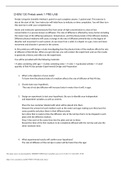
-
CHEM 120 Prelab week 1 PRE-LAB
- Exam (elaborations) • 2 pages • 2022
-
- $12.49
- + learn more
CHEM 120 Prelab week 1 PRE-LAB Prelab: Using the Scientific Method 1 point for each complete answer, 5 points total. This exercise is due at the start of lab. Your instructor will initial here to indicate on time completion. You will then turn this exercise in with your completed lab. Atoms and molecules spontaneously flow from areas of high concentration to areas of low concentration in a process known as diffusion. The rate of diffusion is affected by many factors including the molar mass o...
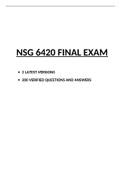
-
SOUTH UNIVERSITY NSG6420 WEEK 10 FINAL EXAM (2 VERSIONS) / NSG 6420 FINAL EXAM (NEWEST, 2021): (100 CORRECT Q & A IN EACH VERSION) |100% VERIFIED AND CORRECT ANSWERS|
- Exam (elaborations) • 91 pages • 2021
- Available in package deal
-
- $30.49
- 4x sold
- + learn more
SOUTH UNIVERSITY NSG6420 WEEK 10 FINAL EXAM (2 VERSIONS) / NSG 6420 FINAL EXAM (NEWEST, 2021): (100 CORRECT Q & A IN EACH VERSION) |100% VERIFIED AND CORRECT ANSWERS| NSG 6420 FINAL EXAM Which of the following is the most common cause of heartburn-type epigastric pain? Question 1 options: a) Decreased lower esophageal sphincter tone b) Helicobacter pylori infection of stomach c) Esophageal spasm d) Peptic ulcer disease Save Question 2 (1 point) An older...
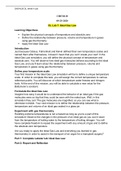
-
CHEM 120 Week 4 Lab; OL Lab 7; Ideal Gas Law
- Other • 4 pages • 2021
- Available in package deal
-
- $15.49
- + learn more
Learning Objectives • Explain the physical concepts of temperature and absolute zero • Define the relationship between pressure, volume and temperature in gases using gas thermometry • Apply the Ideal Gas Law Introduction Just because Celsius, Fahrenheit and Kelvin defined their own temperature scales and named them after themselves, it doesn’t mean that you can’t create your own! In the Ideal Gas Law simulation, you will define the physical concept of temperature and absolute zer...
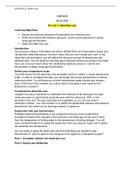
-
CHEM 120 Week 4 Lab; OL Lab 7; Ideal Gas Law
- Other • 4 pages • 2021
-
- $15.49
- + learn more
Learning Objectives • Explain the physical concepts of temperature and absolute zero • Define the relationship between pressure, volume and temperature in gases using gas thermometry • Apply the Ideal Gas Law Introduction Just because Celsius, Fahrenheit and Kelvin defined their own temperature scales and named them after themselves, it doesn’t mean that you can’t create your own! In the Ideal Gas Law simulation, you will define the physical concept of temperature and absolute zer...
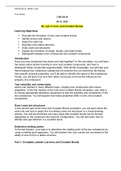
-
CHEM 120 Week 2 Lab; OL Lab 4; Ionic and Covalent Bonds
- Other • 3 pages • 2021
- Available in package deal
-
- $15.49
- + learn more
Learning Objectives • Describe the formation of ionic and covalent bonds • Identify anions and cations • Apply the octet rule • Describe ionic lattice structure • Draw Lewis dot structures • Explain the formation of single, double, and triple bonds • Distinguish between ionic compounds and covalent compounds Introduction Have you ever wondered how atoms are held together? In this simulation, you will learn the basics about atomic bonding in ionic and covalent compounds, an...
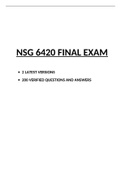
-
NSG 6420 WEEK 10 FINAL EXAM (2 VERSIONS)/ NSG6420 FINAL EXAM (NEWEST, 2021): SOUTH UNIVERSITY (100 CORRECT Q & A IN EACH VERSION) |100% VERIFIED AND CORRECT ANSWERS|
- Exam (elaborations) • 91 pages • 2021
- Available in package deal
-
- $30.49
- + learn more
NSG 6420 WEEK 10 FINAL EXAM (2 VERSIONS)/ NSG6420 FINAL EXAM (NEWEST, 2021): SOUTH UNIVERSITY (100 CORRECT Q & A IN EACH VERSION) |100% VERIFIED AND CORRECT ANSWERS| NSG 6420 FINAL EXAM Which of the following is the most common cause of heartburn-type epigastric pain? Question 1 options: a) Decreased lower esophageal sphincter tone b) Helicobacter pylori infection of stomach c) Esophageal spasm d) Peptic ulcer disease Save Question 2 (1 point) An older ...
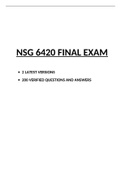
-
NSG 6420 WEEK 10 FINAL EXAM (2 VERSIONS)/ NSG6420 FINAL EXAM (LATEST, 2021): SOUTH UNIVERSITY (100 CORRECT Q & A IN EACH VERSION) |100% CORRECT ANSWERS, DOWNLOAD TO SCORE “A”|
- Exam (elaborations) • 91 pages • 2021
- Available in package deal
-
- $30.49
- + learn more
NSG 6420 WEEK 10 FINAL EXAM (2 VERSIONS)/ NSG6420 FINAL EXAM (LATEST, 2021): SOUTH UNIVERSITY (100 CORRECT Q & A IN EACH VERSION) |100% CORRECT ANSWERS, DOWNLOAD TO SCORE “A”| NSG 6420 FINAL EXAM Which of the following is the most common cause of heartburn-type epigastric pain? Question 1 options: a) Decreased lower esophageal sphincter tone b) Helicobacter pylori infection of stomach c) Esophageal spasm d) Peptic ulcer disease Save Question 2 (1 point) ...
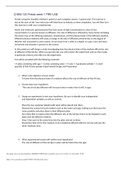
-
CHEM 120 Prelab week 1 PRE-LAB
- Exam (elaborations) • 2 pages • 2022
-
- $12.49
- + learn more
CHEM 120 Prelab week 1 PRE-LAB Prelab: Using the Scientific Method 1 point for each complete answer, 5 points total. This exercise is due at the start of lab. Your instructor will initial here to indicate on time completion. You will then turn this exercise in with your completed lab. Atoms and molecules spontaneously flow from areas of high concentration to areas of low concentration in a process known as diffusion. The rate of diffusion is affected by many factors including the molar mass o...

That summary you just bought made someone very happy. Also get paid weekly? Sell your study resources on Stuvia! Discover all about earning on Stuvia

